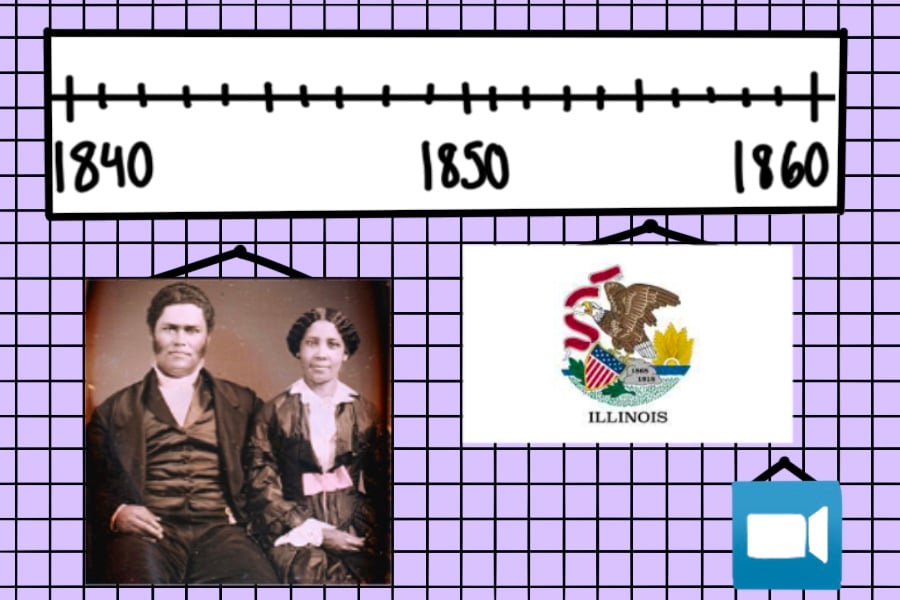History Prof. Kate Masur discusses Black organizing in pre-Civil War Illinois
Daily file illustration by Olivia Abeyta
History Prof. Kate Masur gave a lecture on Black organizing in pre-Civil War Illinois.
October 20, 2022
On Feb. 7, 1865, the Illinois legislature repealed its “black laws” — codified restrictions on Black citizens’ rights — following strong advocacy by Black lobbyists. Almost two centuries later, this day passes by each year without widespread acknowledgment.
Attendees at history Prof. Kate Masur’s “Remembering Illinois’s Early Black History” lecture pondered why Illinois does not celebrate this day, among other questions, at the Dittmar Gallery on Thursday night.
Masur began the event by displaying the web exhibit, “Black Organizing in Pre-Civil War Illinois: Creating Community, Demanding Justice,” that she directed. Launched in February, the site was two years in the making and focuses on Black people’s resistance to Illinois’ oppressive black laws in the pre-Civil War era.
Although many people believe Illinois offered more liberty for Black people than the South, their freedoms were still heavily limited. State laws imposed a number of restrictions on Black citizens, including requiring them to register with local officials as well as prohibiting them from receiving public education and testifying in court cases involving white people. In 1853, Illinois barred Black people from migrating into the state.
“Not many people know about this earlier history, but it’s very dramatic,” Masur said. “It’s full of very telling stories about our collective history. It’s full of stories of community building and also protests against injustice.”
Masur presented three of the website’s 25 profiles, which feature participants in the Illinois Colored Convention of 1853 — where they organized to fight the black laws — as well as other racial justice activists.
Attendees then discussed a series of questions with one another, including some relating to Clint Smith’s One Book One Northwestern keynote address about his book, “How the Word is Passed: A Reckoning With the History of Slavery Across America.” Attendees considered their family histories and the power of local institutions as harbingers of advocacy, among other themes.
Communication sophomore and One Book One Northwestern Student Engagement Fellow Izzy Nielsen said she enjoyed the conversation with her tablemates. Her group included a Marquette University student, an NU alumna from Romania and an NU senior, so they had a range of perspectives to share, she said.
Nielsen, a Chicago native, said she had known a bit about the Great Migration — the mass relocation of Black Americans from the South to the North during the early 20th century — before attending the lecture but not about the black laws and the subsequent Black advocacy to eradicate them.
“I was taught a whitewashed version of Illinois history,” Nielsen said.
First-year history Ph.D student Kenneth Salter said he first became interested in this historical period as an undergraduate, especially since his family history complemented what he was learning in his classes.
After Salter’s great-grandfather, who lived in Mississippi, entered into a physical altercation with a white man, he decided to flee before the man could retaliate in a potentially fatal way, Salter said. His family has lived in Chicago since his great-grandfather escaped to the city in 1925.
Salter, now a contributor to Masur’s project, said challenging traditional narratives about Black people in Illinois and Chicago — including that their history began with the Great Migration — is important work.
“With us understanding the plight of Black people in 19th-century Illinois, and those who resided in the earlier centuries of Illinois, I think that it makes us commemorate the stories of these Black folks who are often overlooked,” he said. “I hope one day America can come to terms with its own history.”
Email: taliawiniarsky2026@u.northwestern.edu
Twitter: @WiniarskyT
Related Stories:
— Faculty, students launch web exhibit covering Black organizing in pre-Civil War Illinois
— Law mandates Black history curriculum in all Illinois public schools
— Clint Smith discusses racial reckoning, slavery at One Book One Northwestern keynote



